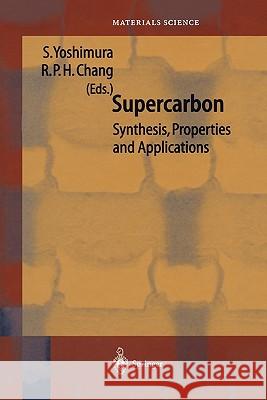Supercarbon: Synthesis, Properties and Applications » książka
Supercarbon: Synthesis, Properties and Applications
ISBN-13: 9783642084058 / Angielski / Miękka / 2010 / 254 str.
The information revolution of the twentieth century was brought about by microelectronics based on a simple and common material, silicon. Although silicon will continue to be of central importance in the next century, carbon, silicon's upstairs neighbor in the periodic table, will also be of great impor- tance in future technology. Carbon has more flexible bonding and hence has various unique physical, chemical and biological properties. It has two types of bonding, sp3 and sp2, in diamond and graphite, respectively. The existence of the latter, "7r-electron bonding," is responsible for carbon's versatile tal- ents. Those materials having extended 7r-electron clouds are called '7r-electron materials'. They include graphite, carbon nanotubes, fullerenes and various carbonaceous materials. They may be called "supercarbon" because of their fabulous multiformity and versatile properties. This volume is a status report on the synthesis, properties and appli- cations of 7r-electron materials, representing an updated proceedings of the International Workshop on 7r-Electron Materials held at the Northwestern University, 'Evanston, Illinois, USA, August 13-14,1996. The Workshop was organized jointly by the Japan Science and Technology Corporation (JST) and the Materials Research Center at the Northwestern University (NWU) in order to provide an opportunity for scientists and engineers to meet and dis- cuss the latest advances in this field and in commemoration of the Yoshimura 7r-Electron Materials Project, one of Japan's national projects in the JST's ERATO (Exploratory Research for Advanced Technology) program.











